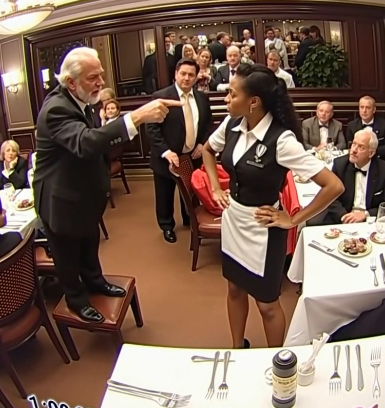 Amara’s calm defiance hung in the air like a palpable force, challenging the status quo in a way that left everyone in the upscale Manhattan restaurant on edge. The room was tense, each diner grappling with the raw display of power and dignity unfolding before them.
Amara’s calm defiance hung in the air like a palpable force, challenging the status quo in a way that left everyone in the upscale Manhattan restaurant on edge. The room was tense, each diner grappling with the raw display of power and dignity unfolding before them.
For Charles Whitmore, a billionaire used to having the world at his feet, the public refusal was a bitter pill to swallow. Accustomed to wielding his wealth as a weapon to bend wills and break spirits, he wasn’t prepared for the unwavering strength of a young waitress who refused to be cowed by his status.
Amara stood her ground, her posture firm and her gaze unwavering. “With all due respect, Mr. Whitmore, shoes can be polished, but a tarnished soul takes more than money to cleanse,” she added, her words delivered with a poise that belied the storm inside her.
The comment drew collective murmurs from the crowd, a mix of admiration and disbelief. Charles, never one to back down, especially in the face of perceived insubordination, aimed to regain control. “You think this act of rebellion will get you somewhere? In my world, defiance comes at a cost.”
But Amara wasn’t intimidated. She had faced bigger challenges in her life than a disgruntled man with a swollen ego. “In my world, Mr. Whitmore, dignity isn’t for sale,” she responded, her voice carrying the weight of unyielding conviction.
Amara’s words sliced through the tension, resonating with an unexpected audience. Some diners, initially shocked, found themselves quietly applauding her courage. A ripple of support began to spread across the room, a testament to the silent solidarity shared among those who understood her plight.
Charles glowered, his bluster momentarily deflated. He reached for his wine glass, the momentary distraction giving him a brief respite from the confrontation. Yet, it was clear that Amara’s message had struck a chord far deeper than he had anticipated.
Amara knew she had taken a significant risk, potentially jeopardizing her job. But her mother had always taught her that self-respect was a treasure worth more than any paycheck. “I understand if I need to leave,” she said, addressing the maître d’ with a calm assurance. “But I won’t be treated as less than human, no matter who I’m serving.”
The maître d’, caught between maintaining the restaurant’s image and dealing with an unruly customer, hesitated. The staff watched, unsure of how the evening would unfold. Then, slowly, a few more guests began to show their support, clapping softly, their gestures spreading like wildfire.
Charles, seeing the tide turning against him, realized that further confrontation would only embolden Amara’s stance and his own notoriety. He scowled, muttering under his breath about the state of the service industry, and abruptly signaled for the check.
As he left, Amara felt the weight of the moment lift slightly, replaced by a newfound respect from her colleagues and patrons alike. Her heart raced, but she stood unbroken, a symbol of resistance against systemic arrogance.
As the evening resumed its course, the impact of her actions lingered, a reminder that sometimes standing for one’s principles can spark a ripple of change. And while Charles Whitmore left with his pride bruised, Amara remained steadfast, embodying the truth that dignity and respect are never earned through submission, but through courage and conviction.





